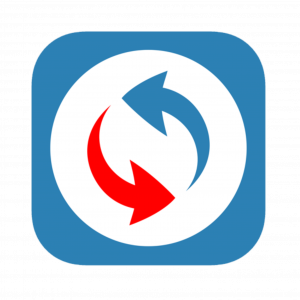Turkish for Tourists: Essential Turkish Phrases Every Tourist Should Know
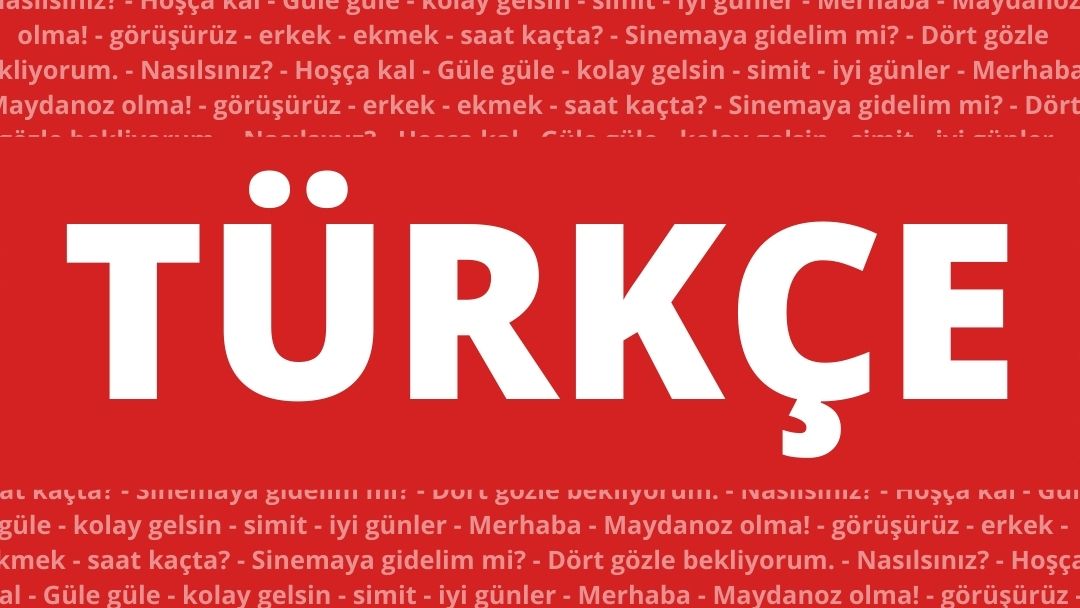
The Art of Living in Turkey contains affiliate links and is a member of the Amazon Services LLC Associates Program. If you make a purchase using one of these Amazon links, I may receive compensation at no extra cost to you. See my Disclaimers for more information.
Are you planning a Trip to Turkey? Then you probably want to learn some Turkish!
Learning some “Turkish for Tourists” before your trip to Turkey can make all the difference in your experience. When I first moved to Istanbul, I dove headfirst into a new culture—and honestly, it was so overwhelming at times.
I arrived without knowing a single word and quickly realized how much easier things could have been if I’d learned some basics.
As English speakers, we often rely on the fact that English is widely spoken, which is true. While many people in Turkey are excited to practice their English with visitors, it’s not something you can count on everywhere you go.
A little effort to speak the local language not only helps you navigate daily interactions but also shows respect for the local culture—earning you plenty of smiles along the way.
Now, after years of living here and becoming fluent at least in the day-to-day, I want to share what I’ve learned to help you avoid the mistakes I made.
Whether you’re ordering a meal, asking for directions, or simply trying to connect with the people you meet, these essential phrases will set you up for a more enriching and stress-free experience.
Let’s dive in and get you ready for your adventure in Turkey!
Why learn Turkish words and phrases?
Learning Turkish phrases is incredibly valuable, whether you’re a tourist or planning to move to Turkey. Here are a few key reasons why it’s worth the effort:
It shows respect and honor.
In Turkey, taking the time to learn and use the local language is a sign of honor and respect—values that are especially important in this part of the world. When you meet people where they are, you’re honoring their culture and identity.
It opens doors to deeper experiences.
Turkish people are renowned for their hospitality and kindness. While you may need to stay cautious in touristy areas, in most cases, locals are proud of their culture and thrilled to share it with those who show genuine interest. Speaking even a little Turkish often leads to richer, more authentic interactions.
Locals will appreciate your effort.
When you speak with locals, even using simple phrases, their excitement is contagious. They’ll love that you took the time to learn their language, and you’ll gain access to unique experiences that many tourists miss out on.
It helps you grow as a person.
Learning a new language—and actually using it—stretches you in ways you might not expect. It builds:
- Humility: You’ll make mistakes, mispronounce words, and need corrections. Sometimes, people might just smile and nod politely—but that’s all part of the process!
- Bravery: Speaking another language can be intimidating, but attempting it shows courage and a desire to connect, even at the risk of “losing face.”
- Compassion: Seeing the world through a different linguistic lens broadens your perspective and deepens your understanding of others.
This blog post will introduce you to useful Turkish words and phrases that will make your time in here smoother and more enjoyable. Whether you’re ordering food, asking for directions, or greeting a local, these basics will come in handy.
A Quick Tip for Beginners:
One of the most helpful things I discovered when I started learning the language is that it’s a phonetic language.
This means every letter always makes the same sound—no tricky exceptions like in English! For me, that was a huge win. If you can see a word, you can sound it out confidently.
(And to those learning English… my hat’s off to you. That’s no small feat!)
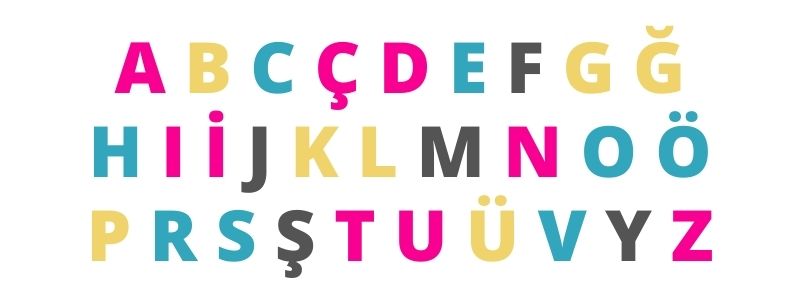
Let’s look at the alphabet
The Turkish alphabet might look familiar because it’s based on the Latin script, but there are some key differences.
Thankfully, when Atatürk established modern Turkey, he transitioned the language from the Arabic script to the Latin alphabet. If not, I’m pretty sure I wouldn’t have learned Turkish as easily!
| Upper | Lower | Pronounced As | Turkish Word |
|---|
| A | a | a in “flood” | araba (car) |
| B | b | Same as English | balık (fish) |
| C | c | j in “jam” | ceket (jacket) |
| Ç | ç | ch in “chair” | çiçek (flower) |
| D | d | Same as English | dede (grandpa) |
| E | e | e in “head” | elma (apple) |
| F | f | Same as English | fil (elephant) |
| G | g | g in “game” | göz (eye) |
| Ğ | ğ | Silent, elongates the letter before | dağ (mountain) |
| H | h | h is never silent! | harita (map) |
| I | ı | i in “igloo” | ışık (light) |
| İ | i | ee in “breeze” | inek (cow) |
| J | j | zh in “pleasure” | jaguar (jaguar) |
| K | k | Same as English | kebap (kebab) |
| L | l | Same as English | limon (lemon) |
| M | m | Same as English | masa (table) |
| N | n | Same as English | nar (pomegranate) |
| O | o | o in “boat” | okul (school) |
| Ö | ö | u in “hurt” | öğretmen (teacher) |
| P | p | Same as English | portakal (orange) |
| R | r | Same as English | robot (robot) |
| S | s | Same as English | sıfır (zero) |
| Ş | ş | sh in “shine” | şapka (hat) |
| T | t | Same as English | tahta (board) |
| U | u | u in “good” | uçak (plane) |
| Ü | ü | ew in “ewe” | üzüm (grape) |
| V | v | Same as English | vazo (vase) |
| Y | y | Same as English | yılan (snake) |
| Z | z | Same as English | zebra (zebra) |
A few quick notes:
- H is never silent, unlike in English. For example, “harita” starts with a clear “ha” sound.
- Turkish doesn’t use the letters q, w, and x.
- It adds a few unique characters: ç, ğ, ş, ö, and ü.
- Yumuşak ge (ğ) is a soft g and acts as a silent connector that elongates the vowel before it. For example, “dağ” (mountain) sounds like “daah.”
“Do you know what a foreign accent is? It’s a sign of bravery.” ― Amy Chua
Personal Experience
When I first moved to Turkey, I’d practice reading every word I saw on my way to my language lessons. It was incredibly helpful!
I also did a post on the best Netflix Shows that you can watch to help you pick up how Turkish sounds. This was really helpful for me to see how Turks say words.
What I realized is that when I became comfortable saying certain words and phrases, it became easier to learn new things. I wasn’t worried about the ones that had become a habit.
To this day I get compliments on how comfortable I am when I speak Turkish, even if there are mistakes. I just go for it and do my best.
I also lived with a Turkish woman for the first year I was here. I do have a friend who does an immersive Turkish experience if you really want to jump headlong into this learning process. Let me know!
With that in mind, let’s jump into some vocabulary!
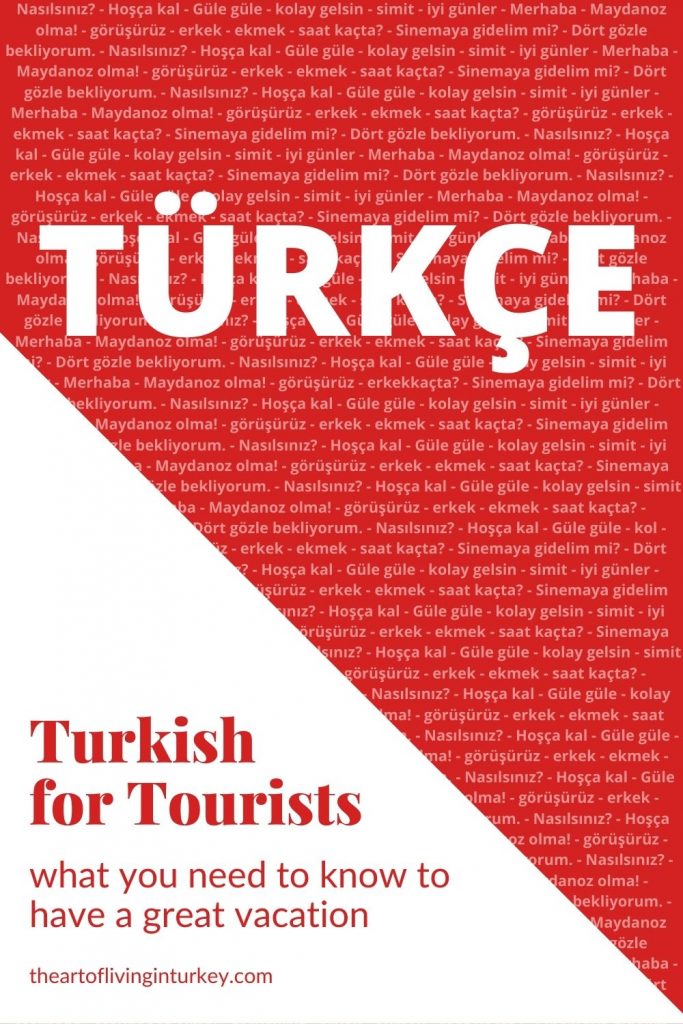
Common Turkish Greetings & Turkish phrases for travel
Greetings are an easy way to connect with locals, and they’re often used together. Turks love saying goodbye with warmth, often adding phrases like “Goodbye. Take care. Kisses.” It’s one of the most endearing things about the culture.
Here are some essential greetings and phrases:
| Turkish | Pronunciation | Meaning | Notes |
|---|---|---|---|
| Merhaba | Mear-ha-ba | Hello | General greeting |
| Günaydın | Gew-ni-din | Good morning | Used in the morning |
| İyi günler | Ee-yee gewn-ler | Good day | Use during the day |
| İyi akşamlar | Ee-yee ak-sham-lar | Good evening | Evening greeting |
| Hoş geldiniz | Hōsh gel-deen-iz | Welcome | Said to guests entering |
| Hoş bulduk | Hōsh bool-dook | Glad to be here | Response to Hoş geldiniz |
| Görüşürüz | Goo-rew-shew-rewz | Goodbye | Informal “See you later” |
| Hoşça kal | Hosh-cha kal | Stay well | Said to the person staying |
| Güle güle | Gew-ley gew-ley | Go smilingly | Response to Hoşça kal |
| Kolay gelsin | Ko-lī gel-seen | May your work come easy | A versatile phrase |
| Nasılsınız? | Na-sill-sin-iz | How are you? | Formal or plural greeting |
Why Greetings Matter
If all you learn is “Merhaba” (hello) and “Nasılsınız?” (how are you), that’s already a win! Even if you don’t understand the response, simply smile and say, “Kusura bakma, Türkçe öğreniyorum” (Sorry, I’m still learning Turkish). Locals will appreciate your effort.
My Favorite Phrase: Kolay Gelsin
This phrase is pure magic in Turkish. It’s a polite way to wish someone ease in their work, and it’s incredibly versatile. Use it:
- When entering a shop or restaurant to start a conversation.
- When leaving, as a friendly goodbye.
- To encourage someone facing a tough task, like a student with a lot of homework.
You’ll hear Turks say phrases like “Kolay gelsin. İyi günler. Görüşürüz” in quick succession when parting ways. It’s warm, friendly, and uniquely Turkish.
Now that you’ve got the basics, let’s jump into some vocabulary for being polite!
Turkish Basics for Being Polite
While Turks may not say “please” and “thank you” as often as you might be used to, it doesn’t mean you shouldn’t! These phrases are still appreciated, and using them will make your interactions smoother and more respectful.
When I first arrived in Turkey, I was told I said “please” and “thank you” a little too much. Honestly, I find that a bit silly—sure, it might make me sound like a foreigner, but guess what? I am one!
Let’s help you convey politeness while traveling.
| Phrase | Pronunciation | Meaning |
|---|---|---|
| Teşekkür ederim | tesh-ek-kewr e-der-eem | Thank you (formal) |
| Teşekkürler | tesh-ek-kewr-ler | Thanks |
| Sağ ol | sa-ol | Informal thank you |
| Lütfen | lewt-fen | Please |
| Afiyet olsun | a-fee-yet ol-soon | Bon appétit |
| Ellerine sağlık | el-ler-eenā sa-lick | Health to your hands (to the cook) |
| Geçmiş olsun | gech-mish ol-soon | May it pass quickly (well wishes) |
| Kusura bakma | koo-soo-ra bak-ma | Excuse me / Forgive me (informal) |
| Özür dilerim | o-zewr dee-ler-eem | I’m truly sorry |
A Closer Look at “Geçmiş Olsun”
“Geçmiş olsun” is one of those wonderfully versatile phrases in Turkish. It’s used as a kind, empathetic gesture when someone is dealing with a difficult situation. For example:
If someone is sick, you say “Geçmiş olsun.”
If a truck splashes water on someone, “Geçmiş olsun!”
Even when someone spills something while eating, you can still say it.
It’s not quite the same as saying, “I’m sorry this happened to you.” Instead, it’s more of a wish for the situation to pass quickly. Of course, you can use both:
“Çok üzgünüm. Geçmiş olsun.”
“I’m so sorry (for you, not for something I did). I hope it passes quickly.”
a Useful Turkish Conversation
Now let’s explore a short, practical conversation you can use to introduce yourself.
Repetition is key! Try practicing this conversation with your travel companions or even out loud on your own. The more you repeat it, the easier it becomes, and soon it will roll off your tongue naturally.
By the time you land in Turkey, you’ll feel confident and ready to go!
| Person A | Person B |
|---|---|
| Merhaba. Benim adım Kimberly. Sizin adınız ne? | Merhaba. Benim adım Ayşe. Memnun oldum. |
| Hello. My name is Kimberly. What is yours? | Hello. My name is Ayşe. Nice to meet you. |
| Ben de memnun oldum. Nasılsınız? | Teşekkürler. İyiyim. Ya siz? |
| It’s nice to meet you too. How are you? | Thank you. I’m well. And you? |
| Teşekkürler. Ben de iyiyim. Yani ben gidiyorum. Görüşürüz. Hoşça kal. | Tamam. Görüşürüz. Güle güle. |
| Thank you. I’m also good. Well, I’m heading out. See you later. Stay well. | Ok. See you. Go smilingly. |
Your Pocket-Friendly Resource
If you want a helpful tool for your travels, consider carrying a Turkish phrasebook. Many include:
Needing help as a Tourist
And now for our last section on helpful phrases. Sometimes you need a little help while navigating this foreign country. Here are some essential phrases to make those moments easier.
| Phrase | Pronunciation | Meaning |
|---|---|---|
| Bakar mısınız? | ba-kar mi-si-niz | Excuse me. (Literally: Can you look here?) |
| Affedersiniz | afā-der-see-neez | Sorry (for small things) / Getting attention |
| Bana yardım eder misiniz? | ba-na yar-dim e-der mee-see-neez | Can you help me? |
| İmdat! | eem-dat | Help! (Emergency) |
| Polis nerede? | po-lees ne-re-de | Where are the police? |
| Alerjim var. | a-ler-jeem var | I have an allergy. |
When to Use These Phrases
- “Bakar mısınız?” is great for getting a waiter’s attention at a café or asking a shopkeeper for help.
Pro tip: Make sure you say “Bakar mısınız?” and not “Bekar mısınız?” The former is asking for their attention. The latter is asking if they are single. - “Affedersiniz” can be used if you bump into someone by accident or need to politely interrupt.
- “İmdat!” is your go-to word in emergencies—use it if you’re in trouble and need immediate assistance.
- “Polis nerede?” is helpful for finding police officers in case of safety concerns.
Keep these phrases written down or saved on your phone so you can quickly access them if needed. Being prepared will make you feel more confident as you explore Turkey!
Language Apps for Your Phone
I have an entire post on the best apps for travelers but there are a couple of great apps with regard to language. Let’s take a look.
Reverso is a great app because it will give you a handful of options for a phrase.
This is especially helpful because Turkish words can have varied meanings.
So if you’re thinking it means one thing, you may miss what is being asked.
Tureng is similar to reverso in that it gives you lots of options.
Often when you use Google Translate, it will give you one option (unless you hit enter) and it doesn’t always fit.
But Tureng will allow you many different options for the word’s meaning.
One last tip for travelers
A final tip that I still find incredibly useful is to install a translation extension on your browser.
- For Google Chrome, the Google Translate Extension works seamlessly.
- If you’re using Firefox, there’s also a built-in option or add-ons that can do the job.
This tool is especially helpful because, while many Turkish websites offer an English option, the translations tend to be very basic. You’ll often miss out on important details that are only available in Turkish.
While it can’t translate text within images, using the extension makes tasks like shopping online or ordering food through Yemeksepeti much easier and more understandable.
Give it a try—you’ll save yourself time and avoid unnecessary confusion!
FAQs for the Turkish Language
Should I learn Turkish before going to Turkey?
I think you should definitely learn a few phrases before you go to Turkey, though learning everything isn’t necessary. It is so much easier to learn when you’re surrounded by the environment.
Do you speak English in Turkey?
Many people do speak English, especially college students or shop owners in tourist areas. Outside that Turks don’t use it enough to be helpful most of the time. I wouldn’t rely on English for communicating.
How do you say hello in the Turkish Language?
You can say hello in Turkish in a few different ways. Merhaba, selam, and ne haber (more like “what’s up”).
Can you go to Turkey without knowing Turkish?
Sure! With technology these days, you can do a lot. When my mom came and went out wandering while I had to work, she used Google Translate with everyone. It isn’t perfect, but it can get the job done for sure! Knowing a few phrases will take you a long way in building relationships though!
Final Thoughts on Turkish for Travelers
Wow, that was quite a lot! I hope you picked up something new or felt encouraged by what you already knew.
If you’ve learned a foreign language before, you know this is just the beginning. But even mastering these basics can make a world of difference on your trip. Taking the time to learn a little Turkish will not only make your experience smoother but will also delight the locals—they truly appreciate the effort!
If you’re looking for Turkish lessons during your visit, I highly recommend Turkish Now—just let them know Kimberly sent you. It’s where I studied and reached B1 level.
Have you started learning any Turkish yet? Did you find this guide helpful? I’d love to hear your thoughts and experiences!
Read more:
- Make sure you check out my favorite gift for those back home
- Visit this epic all-inclusive in Antalya to practice your newly learned Turkish
- There are 8 countries that border Turkey – Read more
- When you come for a visit make sure you pack your carry-on correctly
Turkey Vacation Basics
When I plan a trip these are the websites I use. I hope they help you plan your next adventure as well!
FLIGHTS: I am a huge fan of Skyscanner.
VISAS: You can use the free e-visa portal here but for a few extra dollars you can use iVisa and someone else will handle any issues that may come up.
E-SIM: When I traveled to SE Asia I discovered e-sims and I’m never going back. Airalo has been easy and cheap!
TRAVEL INSURANCE: I use TravelInsurance.com for my trips abroad.
CAR RENTAL: I have loved working with Discover Cars when I rent cars in country.
AIRPORT TRANSFERS: I have used these transfers many times and they are always great. If you’d like more options, I also recommend GetTransfers.com as they allow you to compare companies.
ACCOMMODATION: Find the best Turkey hotel deals on Booking.com.
CITY TOURS & DAY TRIPS: You can browse GetYourGuide’s website to find just the tour you’re looking for! We also recommend the MegaPass for major cities.
